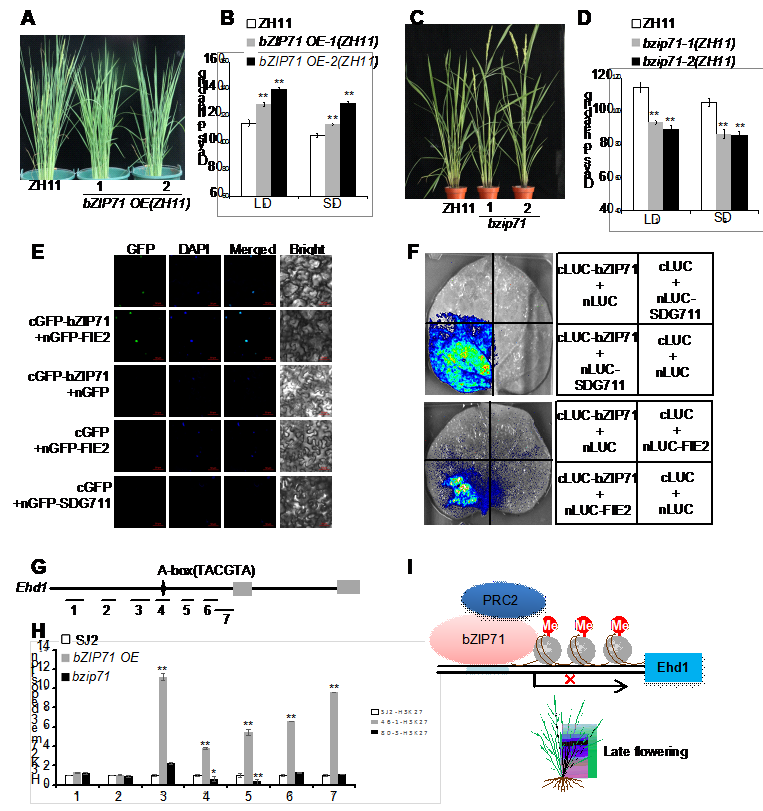Flowering time is a fundamental factor determining the global distribution and final yield of rice (Oryza sativa). Although diverse flowering time genes have been reported in this crop, the transcriptional regulation of its key flowering genes are poorly understood.
In a study recently published in Journal of Integrative Plant Biology, researchers from BU Qingyun's group at the Northeast Institute of Geography and Agroecology, Key Laboratory of Soybean Molecular Design Breeding, Chinese Academy of Sciences report that a basic leucine zipper transcription factor, bZIP71, functions as a flowering repressor. In doing so, they not only offers a novel insight into a flowering pathway, but also provides a valuable putative target for the genetic engineering and breeding of elite rice cultivars.
bZIP71, identified by BU's group, plays crucial roles in abiotic stress responses. Previous studies have shown that the expression of bZIP71 was strongly induced by drought, polyethylene glycol (PEG), and ABA treatments and that bZIP71 OE rice lines display a significantly improved tolerance to drought, salt, osmotic stresses, and cold stress. In this study, they demonstrate that bZIP71 also regulates the rice heading date and reveal the underlying mechanism.
The overexpression of bZIP71 delays flowering, while the bzip71 mutant flowers early in both long-day and short-day conditions. A genetic analysis showed that the regulation of flowering by bZIP71 might be independent of Heading date 2 (Hd2), Hd4, and Hd5. bZIP71 generally functions as a transcriptional activator whereas it functions as a transcriptional repressor of Early heading date 1 (Ehd1). Importantly, bZIP71 directly associates with the Early heading date 1 (Ehd1) promoter and represses its transcription, and genetically the function of bZIP71 is impaired in the ehd1 mutant. Moreover, bZIP71 interacts with major components of polycomb repressive complex 2 (PRC2), SET domain group protein 711 (SDG711), and Fertilization independent endosperm 2 (FIE2), through which bZIP71 regulates the H3K27me3 level of Ehd1, then suppressing Ehd1 expression and delaying flowering in rice.
This study reveals a transcriptional regulatory mechanism of the flowering pathway, in which bZIP71 acts as a transcriptional repressor of Ehd1 to suppress flowering. However, bZIP71 in delaying flowering is dependent on both genotype and day length, a phenomenon that could be further elucidated by the future investigation of the bZIP71-mediated flowering pathway and the upstream regulator and downstream targets of bZIP71.
This study was supported by National Natural Science Foundation of China , and Youth Innovation Promotion Association CAS (Grant No. 2022231).

The model of transcription factor bZIP71 recruit PRC2 to the Ehd1 locus, suppressing Ehd1 expression and delaying flowering in rice.(Image by LI Xiufeng)
The finding of this study was recently published online in Journalof Integrative Plany Biology.
https://www.jipb.net/EN/10.1111/jipb.13275
Key words: flowering time, H3K27me3, rice, transcriptional regulation
The full information of the article:
LI Xiufeng, TIAN Xiaojie, HE Mingliang, LIU Xinxin, LI Zhiyong, TANG Jiaqi, MEI Enyang, XU Min, LIU Yingxiang, WANG Zhenyu, GUAN Qingjie, MENG Wei, FANG Jun, ZHANG Jian and BU Qingyun. bZIP71 delays flowering by suppressing Ehd1 expression in rice[J]. J Integr Plant Biol. DOI: 10.1111/jipb.13275.
Contact:
BU Qingyun
Northeast Institute of Geography and Agroecology, Key Laboratory of Soybean Molecular Design Breeding, Chinese Academy of Sciences, Harbin 150081, China
E-mail:buqingyun@iga.ac.cn